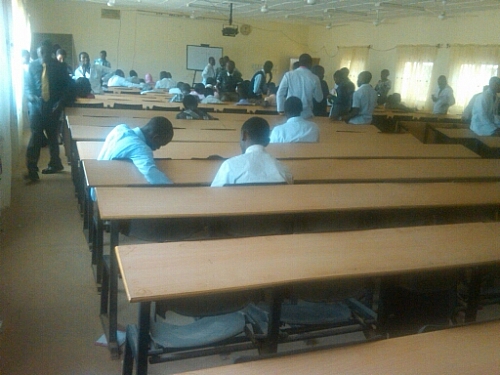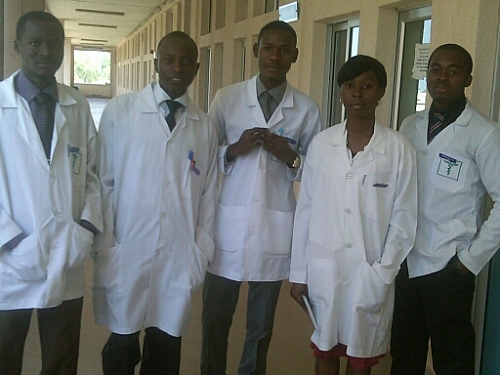.
Medicine and surgery is a rigorous course to study in Nigeria and in other parts of the world because of the nature of the Medical school curriculum and the nature of the examinations. While training to be a Medical doctor; there are certain things you must learn in other to successfully graduate as a medical doctor in Nigeria. Since Medicine is a competitive course, these things can be very demanding. One such thing is the nature of MBBS exam in Nigeria (the Medical students’ examination). The nature of medical exams is not the same as that of other courses; as the exam itself teaches you the ethics of medicine and also helps you to indirectly start practicing even before graduating.
Table of Contents
Schedule for writing Medical students examinations
Medical examinations are not written every year in most medical colleges in Nigeria. Most times you start writing the medical exams at 300 level; this exam is known as 2nd MBBS Medical students’ examination. You then write another one in 400 level known as 3rd MBBS medical examination; and then in 500 Level, you write the 4th MBBS medical exam. Lastly, in your final year (600 level) you write the 5th MBBS medical examination.
The medical curriculum does not follow the normal year as you may think. You may spend more than a year at some levels; this is why the 5th MBBS medical exam is written in the 6th year instead of the fifth year.
Nature of the 2nd MBBS Medical Students Examinations in Nigeria
The second MBBS is written about 2 years after starting Medicine and surgery. You start with non-medical courses in your year one under the faculty of Natural sciences. You are expected to pass the natural science courses before you are promoted to year 2; where you start the medicine and surgery courses proper.
In your 2nd year, you will learn about Anatomy, Physiology, Biochemistry, and Community Medicine. There is no medical students’ examination conducted in year 2 of Medicine, but you’re expected to be reading constantly; as there will be many continuous assessment tests you will be taking after which their cumulative is taken. Failing any continuous assessment affects your total score when added to that of the exam. Whatever you’re thought in your 2nd year; will be added to that of the 3rd year and written as exams. This means that the 2nd MBBS medical students’ examination is a combination of the workload of your 200 and 300 levels.
How is the 2nd MBBS Medical exam conducted in Nigeria?
2nd MBBS Medical students’ examination is divided into 3 parts. The practical, theory, and oral parts in all 3 courses – biochemistry, physiology, and anatomy.
The Theory of 2nd MBBS Exam
This consists of an essay that may have 4 or 5 essay questions; of which you are expected to answer ALL. There is no option for choosing any question to answer. The rationale being that you will not have an option to treat a patient or not. This means you are expected to have a solution to a patient’s problem; hence you are not allowed to choose.
Nature of Multiple-choice questions in Medical students’ examinations
The other aspect of the theory consists of multiple-choice questions (MCQ). These questions consist of A, B, C, D, and E as options; and you are expected to choose each option as being TRUE or FALSE.
An example of MCQ will be:
Question 1: The Human Head is:
- Part of a Body (True) or (False)
- An organ of the Body (True) or (False)
- Contains the eyes (True) or (False)
- Is part of the CNS (True) or (False)
- All of the above (True) or (False)
You are expected to mark either true (T) or false (F) for each option.
One thing about the MCQ is that it contains NEGATIVE marking: this means if you choose a wrong answer, minus 1 will be deducted from what you get. If you score 60 as being right out of 100 questions, your total marks will be 60 20 = 40/100. When you score 45 as being right, your total score will be 45 55 = -5 (the negative 5) will be deducted from any test you write subsequently. The MCQ is timed and you are mostly expected to spend just 30 to 40 seconds to read and answer each question; about 50 minutes or sometimes 60 minutes given to answer 100 questions.
Negative Marking
This type of negative marking is very strict and it is done to help the doctor not to cause harm to a patient by guessing. You are expected to refer a patient to another higher health Facility or you call on a senior colleague but not to guess with someone’s life. That is why I said earlier that the exams help you to learn ethics as well as start practicing right before you finish.
The practical aspect of 2nd MBBS Medical students exams
This aspect consists of all that you have been doing during your practical sessions in the lab. For Biochemistry, you are expected to identify some reagents and objects or tools you normally use in the lab. You are also expected to mix some reagents and use that to identify some chemical compounds such as tests for reducing sugars, tests for carbohydrates, etc.
The practical session is timed and when you waste time, you may end up not doing much.
The Physiology practical is similar to biochemistry as you will do some calculations, do some practical work and answer short questions within 15 seconds (known as Stippled Chase because the questions are answered in haste)
Anatomy consists of the different parts of the body of Cadaver (dead body used for the practical class) being pinned with questions for you to identify the parts, their functions, their blood and nerve supply, etc. You will also identify X-rays and Histology slides and Embryology specimens within seconds.
Oral Examination (Viva-Voce)
This part tests your communication skills and forms a small part of the overall marks in the exam. Your lecturers and some external supervisors (who are also doctors) will ask you some short questions of which you are expected to answer. Your dressing and appearance are also marked.
Nature of the 3rd MBBS Medical Examination in Nigeria
The 3rd MBBS Medical examination is just as the 2nd MBBS but the courses vary. In the 3rd MBBS medical students’ examinations, the courses are Pharmacology and Pathology (consisting of Histopathology, Hematology, Microbiology, and Chemical Pathology).
It consists of 3 parts just as that of the 2nd MBBS medical examination and conducted just as the 2nd MBBS.
Nature of the 4th MBBS Medical Examination in Nigeria
This is the first Clinical examination you will write as you will be given real patients with Medical problems. You are expected to ask the patient questions, conduct a clinical physical examination on the patient, write out your investigations that you would have done, the diagnosis, and possible treatment or management of the medical condition that the patient has.
At the end of the Clinical session with the patient, you will write out everything on a paper and present it to your examiners (who are doctors). Your patient will be there and you cannot lie to the examiners. When you are done, you will be bombarded with questions that might make you sweat even a cold environment.
The clinical part of the 4th MBBS medical students’ examinations determines whether you will pass or fail the exams because you may score high on the Theory (the written exams) but when you don’t get up to half of the marks in your clinical, you will still fail. Having 30 in Clinical and 70 in the written exam will still make you fail the exam and you have to write the repeat exam again. Therefore, clinical work is of more importance than theory.
This does not mean that passing only the clinical will make you pass the whole exam. When you fail the theory and pass the clinical, the marks are added, when your combined score is more than half of the total score, you will pass even though you fail the theory.
The 4thMBBS medical students’ at the University of Jos consists of Obstetrics and Gynecology and Pediatric exams.
Nature of the 5th MBBS Medical Examination in Nigeria
The 5th MBBS exam is the second clinical examination that you will write and it is also the final exam in Medical school. This exam can be full of anxiety as well as motivation (since you will be graduating from the stress of medical school) and fears. It is written just as the 4th MBBS exam and importance is given to the clinical aspect more. For the University of Jos, this exam consists of all the medicine departmental courses as well as surgery departmental courses. These Medicine and Surgery courses comprise of all that you have started learning at 400 level and those you continued at 600 level.
Conclusion
After every Medical student’s examination, a repeat exam or Reseat as some may call it is conducted. This occurs after a few weeks of revision to those that failed. When they pass the Repeat or Reseat exam, they will still continue with their mates when all students resume. Failing the reseat exam again means you will have to wait for your juniors to write with them.
All Medical examinations have the oral, theory, and practical parts with importance given to practical or clinical aspect as that determine whether you become a good doctor or not.
The few weeks (about 2 weeks or some days) taken to write any Medical exam can be very stressful and fearful for Medical students as there are many things you need to read and understand in other to pass which cannot be read in few weeks; hence the reason why most medical students are always found reading their books because the workload is much and in order to pass the exams, preparation must be done many months before the main examination.
Good luck to you if you are writing any Medical exam or just curious about how it is going to be when you finally get the admission to study Medicine. ~~ Dr. Bongdap Nansel Nanzip



